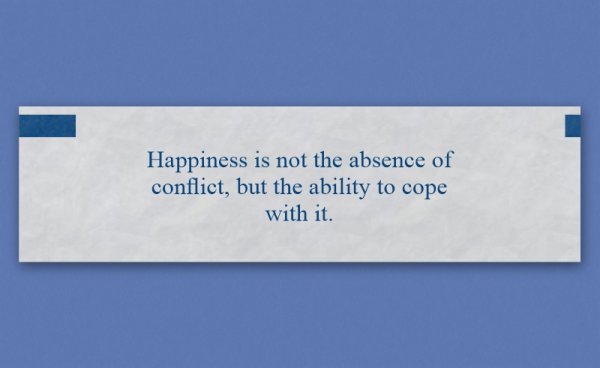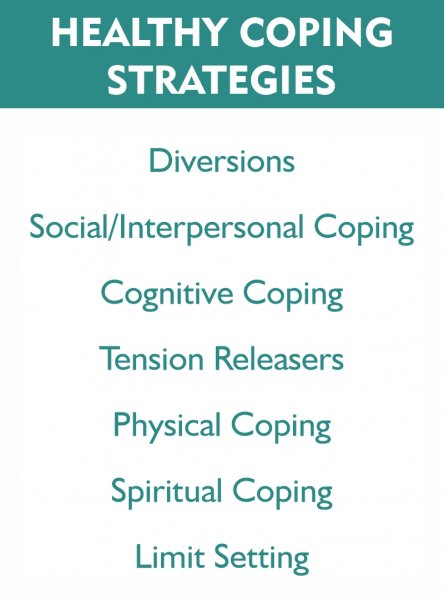Fortune Cookie Friday: Happy Coping
Life is not easy. As much as we would like every day filled with rainbows an lollipops, we all have those days with storm clouds and dropped ice cream on the sidewalk. Days like those might not be perfect, but we can still rejoice in them if we know how to handle the gloomy, messy stuff that comes our way.

Coping is something we all do, whether we are conscious of it or not. Our ability to cope with stress, problems, or uncomfortable emotions allows us to think clearly and solve any issues. Our coping strategies make us stronger and in turn, make us happy.
Since we are all different, we will have our particular ways of coping with our problems. Some of these strategies are healthy and make us resilient, others are destructive and make us weak.
When faced with trials and tribulations in life, the last thing we should do is try to avoid them; they aren’t going to go away on their own. Avoidance and denial are unhealthy actions used in dealing with problems. Some other destructive options are using alcohol, drugs, or self-harm. These types of strategies often provide instant gratification or relief but have long-term negative consequences.
Healthy strategies may not always feel good right away, but they contribute to long-lasting positive outcomes, and there are many kinds from which to choose.
 Healthy Coping Strategies
Healthy Coping Strategies
There is an extensive list of coping strategies by writer Blake Flannery (2018) broken down into these categories:
Diversions
These are activities that temporarily stimulate or amuse us until we can get a handle on the situation or stress.
Many times we can unconsciously work out solutions to our problems through activities such as gardening, listening to music, or reading.
Social/Interpersonal Coping
Interactions with others not only reduce stress but also build relationships with supportive people. These friends can recognize distress signs that we miss and come to our aid.
Some suggestions of these coping skills are spending time with family or friends, role-playing challenging situations with others, or helping someone else in need.
Cognitive Coping
It may seem like a no-brainer, but thinking about the situation can help us deal with stressful situations.
Pausing for a moment to recognize why we are reacting the way we are and considering how to combat it can help us adjust.
Brainstorming solutions, writing a list of strengths, and even lowering our expectations are just a few examples.
Tension Releasers
These coping skills are great for dealing with our initial flood of emotions but should be activities that are safe for ourselves and others.
Exercise is an excellent example of a tension releaser. It will increase stress-reducing hormones and improve our fitness physically and mentally.
Hitting a pillow or yelling into one are examples of cathartic physical activities that fall into this category. We can also try dancing to fast, up-tempo music or kicking soccer balls into an empty net.
We shouldn’t forget that a good cry or laugh can help relieve tension in the body. Depending on the scenario, these activities are socially acceptable in public.

Physical
These activities are not only solutions but preventatives. A healthy diet and getting enough sleep can improve our mental and physical states when dealing with stress. They also make us stronger for challenges in the future.
Deep breathing exercises are also beneficial. This activity directly affects the nervous system (parasympathetic and sympathetic) and aids the body in dealing with stress.
Spiritual
Our well-being depends on how we feel about ourselves. We need to feel connected and worthwhile. We want to have a purpose.
Praying, meditating, or enjoying nature are great examples of spiritual coping skills. They tap into the core of who we are. We can also consider involving ourselves in a worthy cause. Helping others can help us.
Limit Setting
These measures protect us from stress by preventative us from taking on too many things at once.
Saying, “No,” or preferably, “No, thank you,” is something we should all learn to do. But we can also prioritize our tasks or schedule our time.
Setting limits on what we can handle in life can be difficult, but it keeps things manageable and functional.

As I mentioned earlier, these coping strategies don’t always give immediate results, but a big, healthy tree doesn’t grow overnight.
With practice, we can use these techniques to grow the foundational roots of a healthy mind and body. When the storms of life try to blow us down, we can stretch out our branches, stand strong, and be happy.




